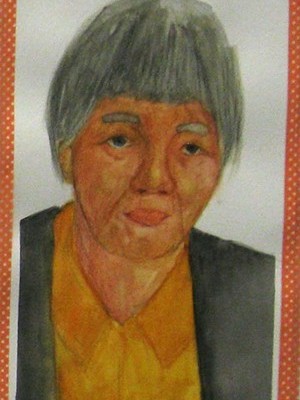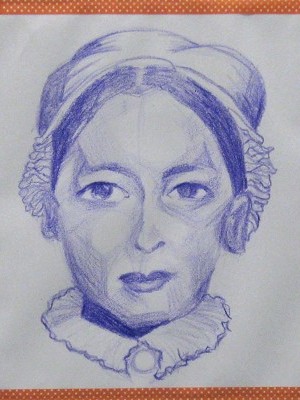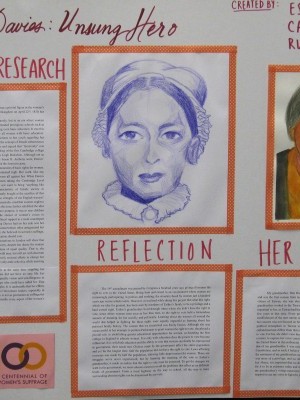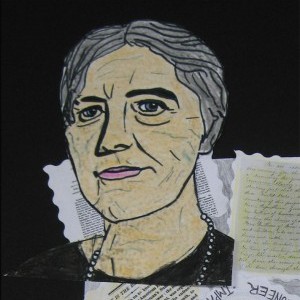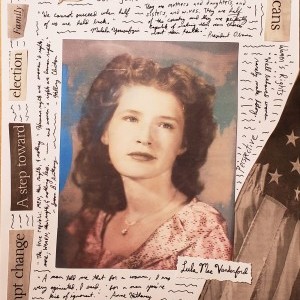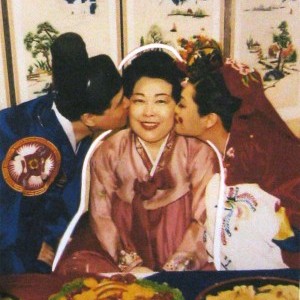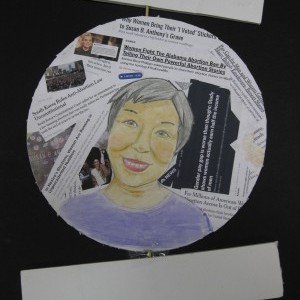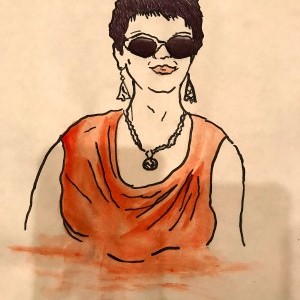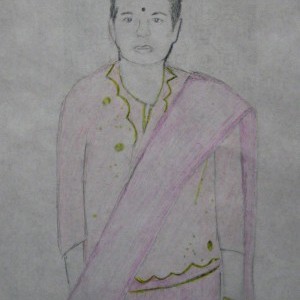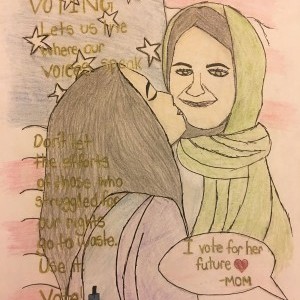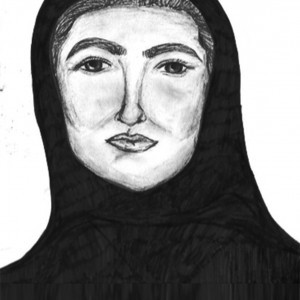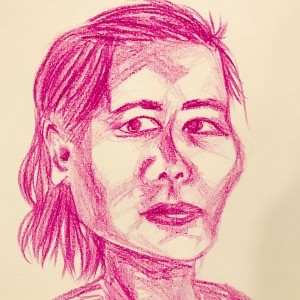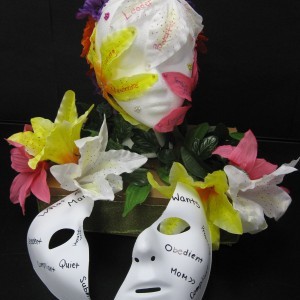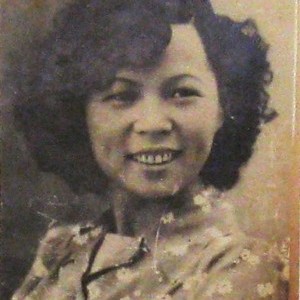Esther Chai, Cathy Chen & Ruby Wang
Townsend Harris High School | Flushing, NY | 11th Grade
Inspirational Family Member
Esther's Grandmother
My grandmother, Wen Hua Chai, immigrated to the United States during the late 1900s and was the first woman from my family to vote in the United States. However, as a primary citizen of Taiwan, she was also the first woman to vote in my entire family. Since my grandmother worked in the Taiwanese government, exercising her right to vote was extremely important to her as Taiwan had been developing as a new nation independent of China for only a few years at that time. Every political issue and every vote was going to be pivotal to the establishment of the new nation and shaping its culture. When she employed her right to vote, her concern was not focused on being able to vote, but rather on using her vote to influence the political atmosphere in Taiwan to create a better nation. Thus, the historical context of her enfranchisement differs from that of the suffragists who were fighting for a woman’s basic right to vote.
For her, she didn’t view her right to vote as a step towards gender equality but more as a means to express her voice concerning important matters in politics. As for me, growing up in the United States in this millennium shaped my perspective on voting differently as compared to that of my grandmother. I was raised under the banner of the Bill of Rights and our esteemed Constitution, and as such, I believe that my right to vote is something I am entitled to. However, the sentiment of my grandmother contrasts sharply from my own, as she felt that her right to vote was more of a privilege, and so, she needed to take full advantage of the opportunity gifted to her. Hence, it is important that we do not take our right to vote for granted, as people have fought for it to be in existence today and women have once viewed it as a privilege. In learning about my grandmother’s voting experience, I have realized the deeper implications of voting and I am inspired to use my voice to fight for justice and human rights
Historical Figure I Admire
Emily Davies
Sarah Emily Davies, widely known as Emily Davies, was a pivotal figure in the women’s suffrage movement. Although Davies was born in the United Kingdom on April 22, 1830, her legacy still lives on today.
Emily Davies was born into an upper-middle-class family, but in an era where women were given limited educational opportunities. Her brothers attended prestigious schools such as Cambridge University while she was prevented from receiving even basic education. It was this difference in treatment that fueled her ambition to provide all women with basic education. Having been influenced by her father’s old-fashioned restrictions in her youth regarding her education, Davies would devote her entire life to overturning the concept of female subservience due to their perceived inherent weakness. She challenged the status quo and argued that “femininity” was in fact a social construct. Her magnum opus was the founding of the first Cambridge college for women, called Girton College, in 1869, with Barbara Leigh Bodichon. Although not as well known in the movement as Elizabeth Cady Stanton or Susan B. Anthony were, Davies’ work in education opportunities for women undoubtedly helped the feminist cause.
Emily Davies lived in a time that was pivotal to the attainment of basic rights for women. The unity and strength of the movement was at an unprecedented high. Her work, like any pioneer’s, was tough: history, politics, and English culture were all against her. When Davies went to the Dean of Canterbury to gain support for women taking the Cambridge Local Examinations, he refused. He expressed sympathy, but did not want to bring “anything like competition or personal public designation into the characteristic of female society in England—believing that any personal eminence would be dearly bought at the sacrifice of that unobtrusiveness, which is at the same time the charm and the strength of our English women” (Caine). Davies completely disagreed with this view, which essentially cited that women ought to be meek and complacent.
The industrialization of England in this time further solidified the idea that women were not of equal caliber to men: should they have purpose, it was to rear children and silently operate mind-dulling machines. Moreover, the silence of women’s voices in government meant that she wasn’t able to quickly muster political support as a male counterpart might have been able to for his own agenda. The one thing Davies had on her side was her socio-economic ties. However, even so, Davies’ own social conservatism often antagonized her from progressive groups seeking similar goals. That is, while she believed in women’s suffrage, she believed also that only who met a certain property qualification should vote.
Analyzing Davies’ history and efforts in various organizations in London will show that she was unwilling to support radical change for women’s society, despite her desire for women and men to be on equal standing by being offered education of equal quality. That is, she believed that women ought to be able to speak intelligently with men, but still act with decorum befitting their status. At her school, Girton College, she actively resisted efforts to change her curriculum from those of Cambridge and Oxford (at the time only male schools), while insisting that her students behave as proper ladies.
London society, thus shaped Davies’ passion, while at the same time crippling her because of her being accustomed to class divisions. Davies did not have an easy life; her devotion to her cause was not echoed by many, and her specific vision and unwillingness to compromise often alienated her from various activist groups who could have aided her. That same devotion, though, allowed her, by herself, to cause ripples. It is undeniable that her efforts set the stage for future generations of women and women’s movement leaders, especially in London, with the founding of Girton College. Although she is not as prominent as suffragists Anthony and Stanton, Davies was involved in virtually every aspect of the women’s movement.
What the Project Means to Me
The 19th amendment was passed by Congress a hundred years ago, giving all women the right to vote in the United States. Being born and raised in an environment where women are increasingly participating in politics and working, the situation faced by women just a hundred years ago seems unbelievable. However, we realized while doing this project that this right, which we take for granted, has been seen by members of Esther’s family to be a privilege and a hard earned right. Esther’s grandmother lived through times where she didn’t have the right to vote, times where women were seen as less than men, so the right to vote held a tremendous amount of meaning for her socially and politically.
Learning about the women all around the world that helped in fighting for these rights were equally impactful as learning about her personal family history. The woman that we researched was Emily Davies. Although she was unsuccessful in her attempts to petition Parliament to grant women the right to vote, she played a pivotal role in establishing greater educational opportunities for women, co-founding the first college in England to educate women. It is only with education that the power to vote becomes influential. It is with both education and the ability to vote that women can finally be represented in government, their needs met. Choices made by the government affect the entire population and yet for the longest time, half the population did not have the right to vote. Laws affecting everyone was made by half the population, allowing little improvement for women. These are struggles we’ve never experienced, but by learning the meaning of the vote for Esther’s grandmother, it made us realize that the right to vote must be exercised. To get the changes we want in the government, we must educate ourselves on all the problems that affect us on different levels of government. From a local highway on the way to school, all the way to laws surrounding abortion rights can be determined by our vote.
Explore the Archive
More From This Class
Click on the thumbnails below to view each student's work.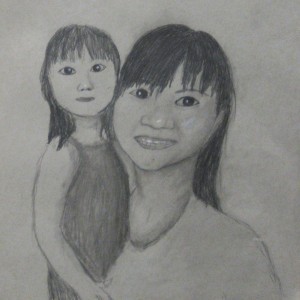
Vivian Chen, Josephine Chen, Ivan Chan, Zafirah Rahman, Neeharika Reddy, Daniel Shi, Daniel Shi, Jacqueline Cho & Osiris Guerrero

Jennifer Moran, Adebola Ademola, Julia Hong, Vicki Kanellopoulos, Inga Kulma, Maimunah Virk, Deborah Molina & Kailey Van
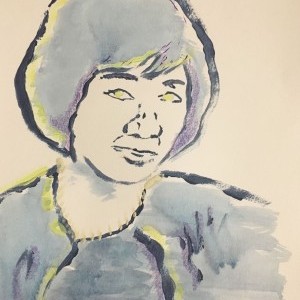
Kristina Chang, Sarah Chowdhury, Bethany Leung, Letian Fang, Cathy Choo, Kelly Chan, Emily Tan, Adamary Felipe & Kenney Son

